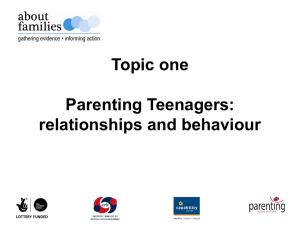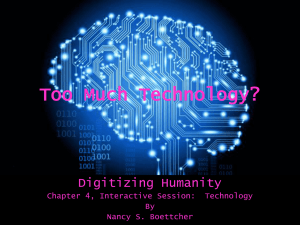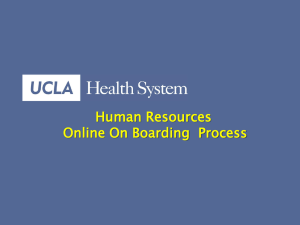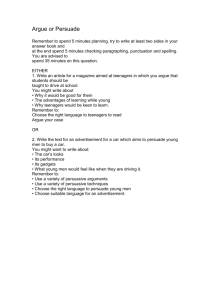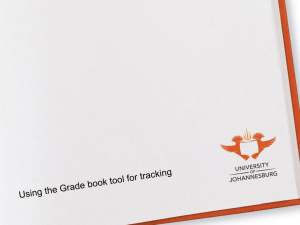Essential Library The Whole Brain Child
advertisement
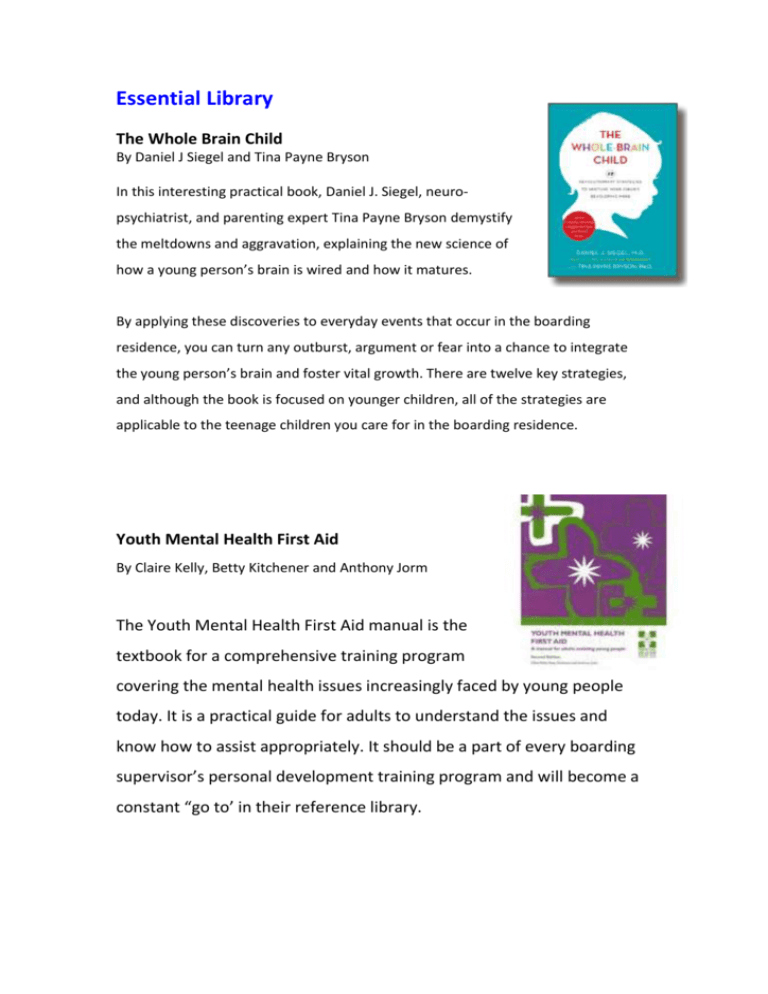
Essential Library The Whole Brain Child By Daniel J Siegel and Tina Payne Bryson In this interesting practical book, Daniel J. Siegel, neuropsychiatrist, and parenting expert Tina Payne Bryson demystify the meltdowns and aggravation, explaining the new science of how a young person’s brain is wired and how it matures. By applying these discoveries to everyday events that occur in the boarding residence, you can turn any outburst, argument or fear into a chance to integrate the young person’s brain and foster vital growth. There are twelve key strategies, and although the book is focused on younger children, all of the strategies are applicable to the teenage children you care for in the boarding residence. Youth Mental Health First Aid By Claire Kelly, Betty Kitchener and Anthony Jorm The Youth Mental Health First Aid manual is the textbook for a comprehensive training program covering the mental health issues increasingly faced by young people today. It is a practical guide for adults to understand the issues and know how to assist appropriately. It should be a part of every boarding supervisor’s personal development training program and will become a constant “go to’ in their reference library. Emotional Intelligence By Gill Hasson Emotional Intelligence is the ability to identify, assess and control the emotions of yourself and others. Raising your Emotional Intelligence will improve your performance, satisfaction and confidence. Some say a high EQ is more important to the quality of your life and your success than your IQ. The ability to harness your emotions and use them effectively for decision-making, problem solving and self-regulation means being able to support young people as they develop these skills and learn to becoming self-regulating adults. Contains practical chapters on Managing Emotions by Being Assertive, Understanding and Managing Anger, Anxiety, Bullying, etc and Motivating and Inspiring Others. There is a very relevant chapter (10) on understanding and managing bullying. How to help someone who is being bullied, How to manage a bully assertively. The Princess Bitchface Syndrome By Michael Carr-Gregg In this hard-hitting book, Carr-Gregg focuses on understanding the unprecedented pressures on young girls growing up fast in this current age, with puberty starting earlier than ever before, and their physical development shooting ahead of their cognitive capacities. He gives valuable insight into understanding the developing adolescent brain, the formation of self-image and strategies for positively relating to and guiding girls as they navigate the adolescent years. Carr-Gregg has also written the following books which will be relevant to boarding supervisors caring for teenagers: Beyond Cyber-bullying Surviving Year 12 Surviving Adolescents When to Really Worry - Mental Health problems in teenagers and what to do about them Teenagers Alcohol and Drugs By Paul Dillon Teenagers, Alcohol and Drugs, released in February 2009, was written in response to the stories Paul Dillon heard over 25 years in alcohol and other drug education. It provides answers to the questions he has been asked by both young people and their parents and also includes solutions to the many scenarios he has heard about from anxious teenagers who haven’t known what to do when things went bad. This book shows boarding supervisors how to talk to students in a way that is respectful and reasonable, non-threatening and non-judgemental. It will help them understand the issues students are facing, and show them how to help young people negotiate the minefield of misinformation and social pressure in a calm and sensible way to tell them what they really want and need to know about alcohol and drugs. Teaching with Poverty in Mind By Eric Jensen In Teaching with Poverty in Mind: What Being Poor Does to Kids' Brains and What Schools Can Do About It, veteran educator and brain expert Eric Jensen takes an unflinching look at how disadvantage and home violence hurts children, and how schools can improve the life readiness and academic achievement of stressed, damaged or disadvantaged students. Jensen argues that although chronic exposure to fear, violence or tension can result in detrimental changes to the brain, the brain's very ability to adapt means that it is equally susceptible to the positive effects of rich, balanced learning and living environments, where caring relationships can build students' resilience, self-esteem, and character. Although Jensen has focused the book on schools, the content is equally relevant to the boarding environment. Uncommon Sense for Parents with Teenagers By Michael Riera Since its initial publication in 1995, Uncommon Sense for Parents with Teenagers has helped countless families through the trying years of adolescence. In this revised and updated edition, Riera tackles some of the newest issues facing parents and teens, and gives a second look to the old standbys—alcohol and drugs, academics, sex and dating, sports, eating disorders, making friends, single parenting, divorce, and more. Riera’s two decades of experience working with teens creates an extremely relevant and helpful reference for not only parents but house parents and teachers. Growing Great Boys In Growing Great Boys, parenting guru Ian Grant shows how to work with the essential character of boys, using understanding and emotional support to nurture young boys through adolescence. While this is a ‘parenting’ book it is still very relevant to the boarding context. Ian Grant has written other books including; Fathers Who Dare Win Growing Great Families Growing Great Girls Communicate The New Rules of Engagement Michael McQueen "The new rules of engagement: a guide to understanding and connecting with Generation Y" Summary from Amazon - To some they are the tech-savvy, well educated and ambitious youngsters poised to take on and change the world. Others however, describe a disloyal, disrespectful and demanding generation who have never learned to wait or really work hard for anything. Born between the early 1980's and the late 1990's Generation Y has certainly caused a stir in recent years. Parents, teachers and business owners alike face the challenge of understanding and engaging a generation who have essentially grown up in a different world. In this ground-breaking bestseller, you will learn how the era into which you are born has a profound effect on your perceptions and worldview. Building on this understanding, you will begin to see why Generation Y are so different and discover some powerful strategies for engaging them be it at home, in the classroom or at work. Distressed or Deliberately Defiant? Managing challenging student behaviour due to trauma and disorganised attachment. Dr Judith Howard It is not unusual for educators today, whether in the early childhood, primary or secondary sectors, to be confronted with severely challenging student behaviour - students who fly into unexplained violent and oppositional outbursts with little warning; who respond poorly to tried-and-true behaviour management processes. Such behaviour has considerable impact on the delivery of teaching and learning programs and the emotional wellbeing of the teachers themselves as well as raising safety risks for the entire school community. This book explains the basis for such behaviour as the neurological, physiological and behavioural outcomes of "disorganised attachment" due to prolonged exposure to a traumatic home life and provides practical advice to educators on ways that schools can effectively manage these students. By examining the science behind attachment theory, the neurobiology of behaviour, and the manifestation of disorganised attachment in the school context, this book will help educators: •minimise such challenging behaviour, •manage crises and disciplinary responses such as suspension and expulsion, •improve student compliance, •enhance education and overall wellbeing, and •deal with parents. Covers early childhood, primary and secondary settings.
